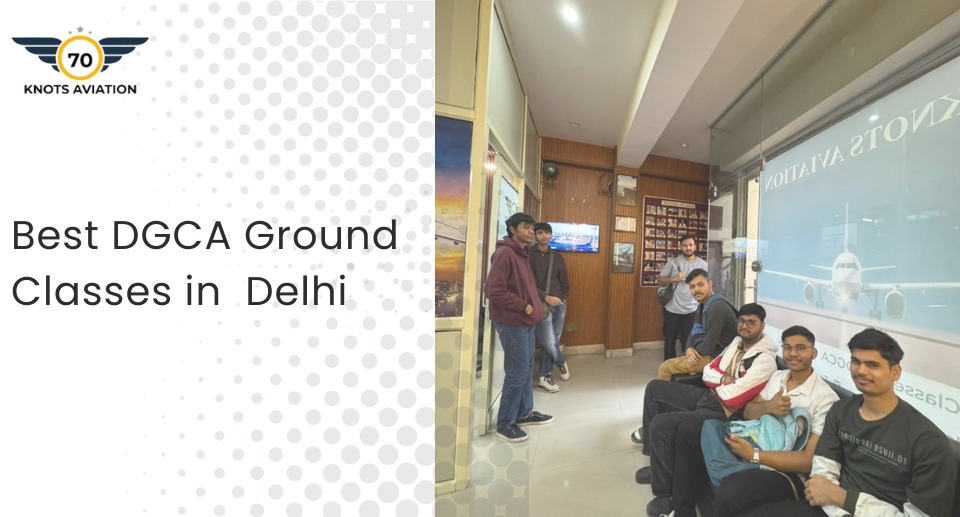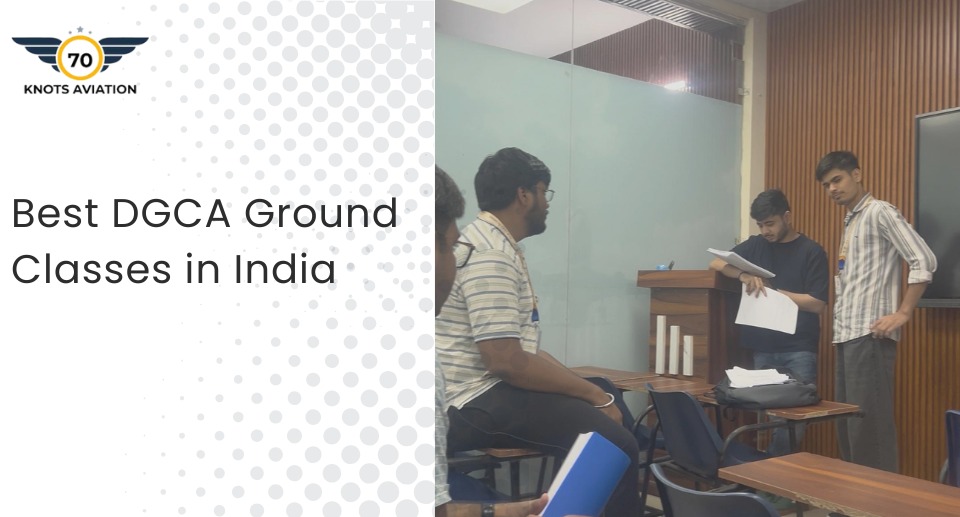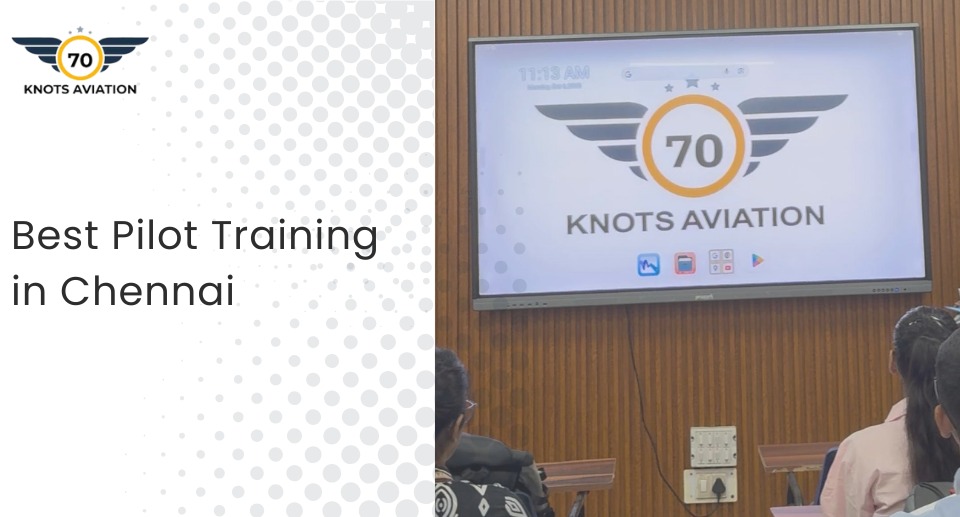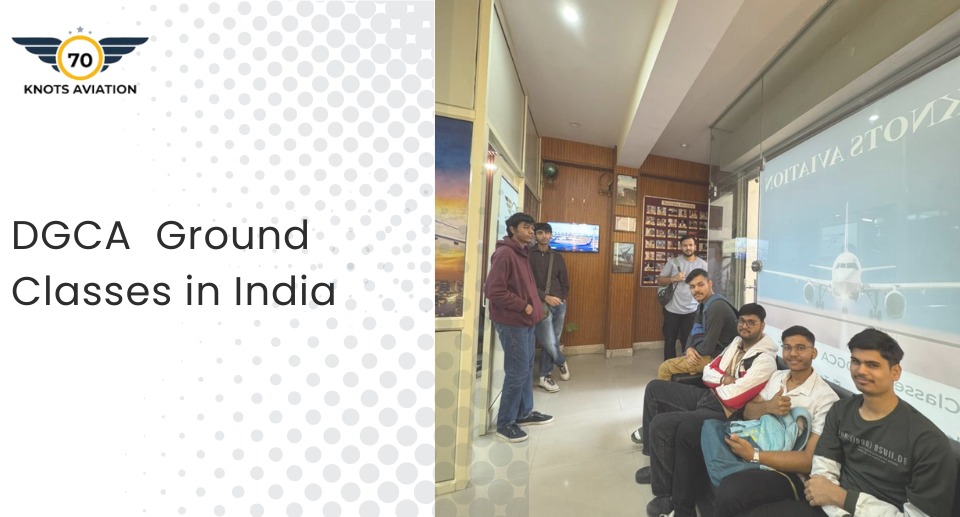Ground Classes for Pilot License in India: Eligibility, Duration & Tips
Any successful pilot training program in India is totally based on the ground classes it provides. Subjects such as air regulations, meteorology, navigation, flight planning, and others are essential topics that you must learn before you even go for real-life flying. These ground classes prepare you to sit for the DGCA written tests and also provide you with the assurance that you need in order to proceed to practical flying.
Our curriculum of ground classes at 70 Knots Aviation is rigid and includes your pace in mind with the hope that we take you and make it easy for you to have a firm foundation on what lies ahead of you and prepare you to be successful.
Eligibility Criteria for Ground Classes in India
The eligibility criteria that you need to fulfill in order to enroll in a ground class in India are as follows:
Minimum Age Requirements
You have to meet the age requirements of the DGCA before you are allowed to start your ground classes in India. As a rule, to obtain a Private Pilot License (PPL), you need to be 16 years old, but you need to be 17 years old to obtain a Commercial Pilot License (CPL) and 21 years old in case of your desire to have an Airline Transport Pilot License (ATPL).
Educational Qualifications
The academic background also counts when you want to join a ground class for your pilot license training. You are required to have completed your 10+2 with Physics and Mathematics as the core subjects.
In the case you belong to some other stream or have not studied these subjects, you will have to undergo bridge courses that will help you learn about those subjects. You can go for the National Institute of Open Schooling exams as well. By fulfilling these requirements, you meet the educational criteria to begin your journey in the ground classes.
Medical Certification Essentials
Anyone who wants to begin any course of training as a pilot must have a valid medical certificate. You will have to possess a Class 2 Medical Certificate, and it must be converted to a Class 1 certificate during your orientation towards a commercial license. The two exams involve testing your vision, hearing, cardiovascular fitness, and general health to ensure that you are physically fit. This helps you to check whether you can work as a pilot or not.
Language Proficiency Standards
The aviation industry is all about communication, and the command of the English language is not a matter of compromise. The International Civil Aviation Organization (ICAO) mandates that all pilots prove language proficiency. With this standard, you will be able to obey the instructions given by the air traffic control and can also establish good coordination with the crew members. In case you require more language training prior to your enrollment, our well-experienced faculty members at 70 Knots Aviation will assist you in becoming competent in your abilities so that you become fluent in communication.
Duration of Ground Training for Pilot License in India
The duration of ground training for a pilot license in India is as follows:
PPL Ground Training Duration
Ground training usually lasts for about 3 to 4 months in case you are going for a Private Pilot License (PPL). At this time, you study the underlying topics such as air regulation, meteorology, and general navigation. This focuses on building a strong background of knowledge prior to turning to flying lessons.
CPL Ground Training Duration
A Commercial Pilot License (CPL) takes a long time because the curriculum is complex. The duration of ground classes is, on average, 6-8 months. The syllabus is more comprehensive and covers advanced sections that involve the aspects of instrument flying, radio aids, and aircraft systems. At the end of this course, you will be perfectly prepared for the corresponding DGCA written exams.
ATPL Ground Training Duration
To pursue the Airline Transport Pilot License (ATPL), you will have to spend about 8-10 months in the ground school. The course is filled with top-notch ideas, such as advanced flight planning, air regulations, and crew resource management. ATPL is the highest form of pilot licensing available, which allows you to get a better understanding of airline operations.
Full-Time vs. Part-Time Schedules
You may opt to take full-time courses where the overall period is reduced as compared to taking part-time classes if you are under obligations elsewhere. The right choice depends on your personal schedule and learning style.
Weekend and Modular Courses
Some ground schools also have weekend or modular programs, which are designed to accommodate the needs of working professionals and students. Such dynamic alternatives will help you move forward in small steps without interrupting your current routine. You will, therefore, have the opportunity to take your ground training at a rate that you find comfortable.
Tips to Make the Most of Your Ground Classes
Here are some tips that you can use to make the most of your ground classes:
Establish a Consistent Study Routine
Make your ground classes a commitment and set aside routine time to study the material. Even short-time sessions where you study new information every day will make you learn complex subjects bit by bit, which is more productive than a last-minute crummy method.
Take Thorough Notes and Review Regularly
As you keep on progressing, keep your notes in order and mark down the key ideas. At the end of every class, go through your notes when the information is still fresh in your mind. Reading them again after an interval of a few days will enhance retention and ease the preparation of your written exams.
Use Flight Simulators and Practice Tools
Simulators or web-based tools should be used to help in knowing about the application of the theoretical concepts into practice. Even a flight simulator alone will allow you to visualize what you have learned about instruments, charts, or weather patterns so that you can access your learning easily.
Ask Questions and Interact in Class
Do not be afraid to ask questions when you have doubts about any issues regarding your ground training course. You can also communicate with your instructor and classmates to get to know more and possibly find some good hints or new angles so that you can understand everything easily.
Join Study Groups or Discussion Forums
Studying in a group will hold you accountable as well as offer you a chance to share ideas. You can also join a small study group taking up hard topics or forums to join like-minded trainees to support you so that you can remain involved and focused in your course.
With the help of these strategies, you will get the best of every ground training session and have a good starting point, after which practical flying lessons can be completed easily.
Conclusion
Ground training classes help you get the right knowledge that you need in order to become a good pilot. For this, you just have to meet the eligibility criteria, select the right schedule, and remain focused. At 70 Knots Aviation, we support you every step of the way so that you can get your pilot’s license easily and achieve your dreams of aviation successfully.




